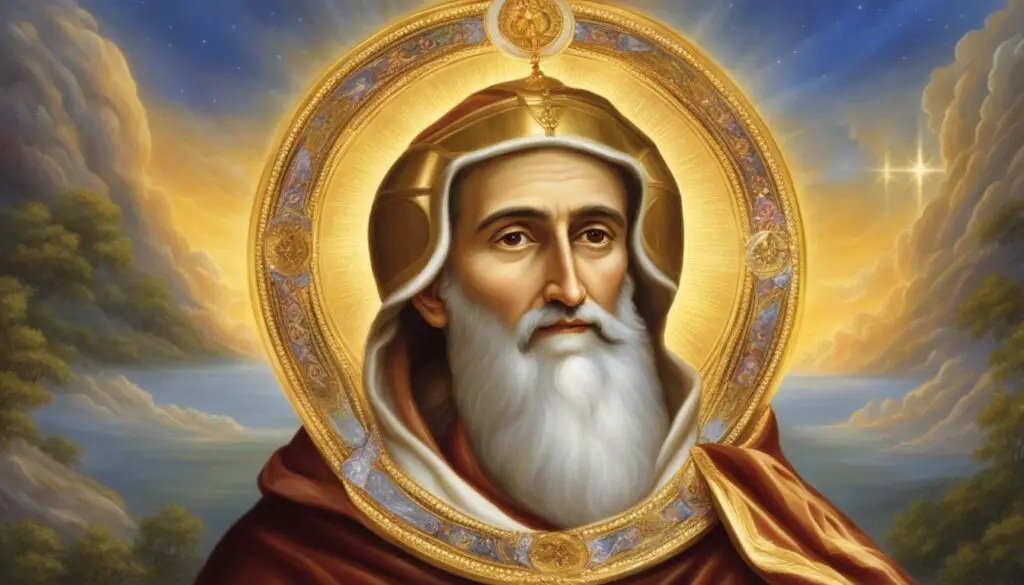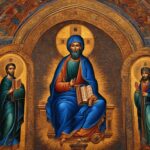St. Gregory Narekatzi, also known as Gregory of Narek, remains a revered figure in Armenian religious tradition. As an Armenian theologian, poet, monk, and mystic, his contributions to the Armenian church, Christian saints, and Armenian culture are unparalleled. Born in the 10th century in what is now eastern Turkey, Gregory’s early life and background laid the foundation for his profound spiritual journey. His call to religious life led him to become a priest and devote his days to teaching theology and sharing his deep spiritual insights with others.
Gregory’s most significant work, the Book of Lamentations, also known as Narek, is a masterpiece of Armenian literature. Filled with prayers and confessions, this collection continues to be cherished by Armenians and is a testament to Gregory’s spiritual life and philosophy. Despite facing challenges and criticisms, Gregory’s influence only grew, and his contributions were recognized by both the Armenian Apostolic and Catholic Churches. In 2015, Pope Francis declared him a Doctor of the Church, solidifying his impact on Christian thought and spirituality.
Today, the legacy of St. Gregory Narekatzi lives on in Armenian culture and heritage. His profound spiritual insights and poetic expressions of faith continue to inspire readers and deepen their understanding of Armenian spirituality. Gregory’s works are treasured as national treasures, and his life serves as a testament to the enduring power of faith and the pursuit of spiritual enlightenment.
Key Takeaways:
- St. Gregory Narekatzi, also known as Gregory of Narek, was an Armenian theologian, poet, monk, and mystic.
- His most significant work, the Book of Lamentations, is considered a masterpiece of Armenian literature.
- Gregory’s spiritual insights and poetic expressions of faith continue to inspire readers and deepen their understanding of Armenian spirituality.
- He was recognized as a Doctor of the Church by Pope Francis in 2015.
- The legacy of St. Gregory Narekatzi lives on in Armenian culture and heritage.
Early Life and Background
St. Gregory Narekatzi was born in the 10th century in a village on the southern shores of Lake Van, in what is now eastern Turkey. Coming from a family deeply connected to the Armenian Apostolic Church, his upbringing in an intellectual and religious environment shaped his spiritual journey and the development of his profound mysticism.
Gregory received a religious education at the monastery of Narek, where his deep understanding of Armenian culture and heritage began to influence his writings and teachings. This early exposure to the teachings and traditions of the Armenian Apostolic Church laid the foundation for his future contributions to Armenian history and culture.

Throughout his life, Gregory’s work would reflect his deep connection to Armenian culture and his dedication to preserving and enriching the Armenian heritage.
Call to Religious Life
Inspired by his family’s devout faith and his own spiritual calling, St. Gregory Narekatzi made the decision to dedicate his life to the service of God. He recognized the profound importance of his faith and felt a strong desire to fully commit himself to the teachings of the Armenian church and the path of Christian saints.
To fully embrace his calling, St. Gregory Narekatzi was ordained as a priest. He took on the responsibility of teaching theology and sharing his deep spiritual insights with others. At the monastery of Narek, he dedicated his days to guiding and inspiring fellow believers on their spiritual journeys.
St. Gregory Narekatzi’s commitment to his religious calling is evident in his writings. His works are filled with prayers and meditations, offering profound reflections on the nature of God and the human condition. Through his words, he sought to deepen the spiritual connection between individuals and their faith, encouraging a deeper understanding of Armenian history, culture, and the teachings of the Christian saints.

Major Works by St. Gregory Narekatzi
| Works | Description |
|---|---|
| Book of Lamentations (Narek) | A collection of prayers and confessions considered a masterpiece of Armenian literature and a profound expression of spiritual devotion. |
| Hymns and Panegyrics | Compositions of sacred songs and praises dedicated to God, celebrated in Armenian churches as part of the liturgy. |
| Spiritual Songs | Poetic compositions that convey religious teachings and inspire believers to deepen their faith. |
Work
One of St. Gregory Narekatzi’s most significant contributions to Armenian culture and heritage is his Book of Lamentations, also known as Narek. This collection of prayers and confessions holds a profound place in Armenian literature, and it stands as a masterpiece of spiritual expression. For centuries, the Book of Lamentations has been cherished by Armenians, serving as an integral part of their religious and cultural traditions. Its timeless significance continues to resonate with readers, offering solace and guidance in moments of introspection and devotion.
Aside from the Book of Lamentations, Gregory composed hymns, panegyrics, and spiritual songs that continue to be sung in Armenian churches to this day. His poetic and lyrical compositions capture the essence of Armenian spirituality, further enriching the cultural heritage of the Armenian people.

Gregory’s works inspire a deep connection to Armenian literature, culture, and heritage. They provide a spiritual lens through which readers can explore the profound depths of faith and introspection. Gregory’s writings invite individuals to embark on a profound journey of self-discovery and enlightenment, captivating hearts and minds with their poetic beauty and timeless wisdom.
Spiritual Life and Philosophy
St. Gregory Narekatzi’s spiritual life was defined by his unwavering devotion to God and his profound belief in the transformative power of prayer. His contemplative nature and relentless pursuit of understanding the mysteries of God are evident in his writings, which continue to inspire and enlighten readers.
Gregory’s philosophy revolved around the concept of eternal salvation through faith and divine grace, aligning closely with the teachings of the Armenian Apostolic Church. He emphasized the importance of prayer as a means of developing a deep and personal relationship with God. His theological insights and spiritual guidance have had a profound impact on Armenian theology and spirituality.
“Prayer is the voice of the heart, reaching out to the divine presence. It is the bridge between the human and the divine, connecting us to the source of all wisdom and love.” – St. Gregory Narekatzi
Through his profound exploration of faith and contemplation, St. Gregory Narekatzi left an indelible mark on Armenian literature and the spiritual lives of countless individuals. His teachings continue to provide solace, guidance, and inspiration to those seeking a deeper connection with God.

Challenges and Criticisms
Despite being revered as a saint and a respected theologian, St. Gregory Narekatzi faced challenges and criticisms throughout his lifetime. His unwavering commitment to his spiritual teachings brought him into conflict with certain factions within the Armenian church. He was accused of heresy and of sympathizing with Christian sects that deviated from traditional Armenian beliefs.
However, Gregory steadfastly defended his orthodoxy and refused to waver in his commitment to his faith. He eloquently articulated the core principles of his spiritual teachings, seeking to bridge the divide between differing perspectives within the Armenian church.
“I am but a humble servant of God, seeking only to illuminate the path of righteousness. My teachings are inspired by the deep well of Armenian tradition, and I strive to bring the faithful closer to the divine essence.”
Gregory’s unwavering commitment to his spiritual writings and teachings caused him to face opposition and criticism. Despite these challenges, his influence continued to grow, and his works remained highly regarded among the Armenian faithful.
Today, the enduring impact of St. Gregory Narekatzi’s contributions to Armenian history, literature, and the Armenian church is undeniable. His profound insights and devotion are a testament to the power of faith and the resilience of the human spirit. Through his writings, he continues to inspire and guide generations, leaving a lasting legacy in the hearts and minds of the Armenian people.

Reflections and Personal Testimonies
The challenges faced by St. Gregory Narekatzi have not dimmed the reverence and admiration that the Armenian faithful hold for him. People from all walks of life continue to find solace and inspiration in his works, turning to his writings as a source of guidance and comfort. His spiritual teachings have touched the lives of countless individuals, fostering a deep sense of connection and understanding.
Armenians worldwide carry the spiritual teachings of St. Gregory Narekatzi in their hearts, finding strength and resilience in the face of adversity. His profound insights into the human condition and the nature of the divine continue to resonate with readers, offering valuable lessons and timeless wisdom.
The challenges and criticisms faced by Gregory during his lifetime serve as a reminder that even the most revered figures are not immune to opposition. Yet, it is through the endurance and steadfastness in the face of adversity that the legacy of St. Gregory is strengthened, ensuring that his spiritual teachings continue to shine brightly for generations to come.
Recognition and Awards
Gregory’s immense contributions to Armenian theology and literature have garnered widespread recognition and admiration throughout history. His profound spiritual insights and poetic expressions of faith have left an indelible mark on Armenian culture and heritage. As a testament to his significant impact, Gregory is venerated as a saint in both the Armenian Apostolic and Catholic Churches, solidifying his status as one of the most revered Christian saints in Armenian history.
The appeal of Gregory’s writings extends beyond religious circles. Scholars and readers alike have extensively studied and appreciated the depth and beauty of his literary works. His writings offer profound reflections on the nature of God and the human experience, making them a valuable resource for understanding Armenian spirituality and enriching one’s personal faith journey.
“His words resonate across centuries, reminding us of the timeless truths that continue to guide us in our spiritual quest.”
In a momentous recognition of Gregory’s significance, Pope Francis declared him a Doctor of the Church in 2015. This prestigious title is reserved for theologians who have made exceptional contributions to Christian thought and spirituality. Gregory’s elevation to this esteemed position further solidifies his status as a theological luminary and serves as a testament to the far-reaching influence of his writings.
Through his profound insights and lyrical expressions, St. Gregory Narekatzi continues to inspire and guide individuals on their spiritual journeys. His legacy serves as a beacon of light for those seeking a deeper understanding of their faith and a connection to the wisdom of the Christian saints. The recognition and awards bestowed upon Gregory are a reflection of his enduring impact on Armenian literature, theology, and the wider world of Christian spirituality.
Miracles and Path to Sainthood
St. Gregory Narekatzi, renowned for his profound spiritual teachings and literary contributions, is also associated with numerous miracles attributed to his intercession. These miraculous stories speak of healing, spiritual guidance, and divine intervention in the lives of those who sought St. Gregory’s assistance. Each miracle stands as a testament to the enduring impact of his spiritual legacy.
Throughout history, the Armenian faithful have looked to St. Gregory Narekatzi as a source of hope and inspiration in times of need. Countless accounts recount individuals experiencing remarkable healings, both physical and spiritual, through St. Gregory’s intercession. These miraculous interventions, witnessed and acknowledged by believers, have played a significant role in his path to sainthood.
“It was when my child fell gravely ill that I turned to St. Gregory Narekatzi, beseeching his intercession. I prayed fervently, and in a miraculous turn of events, my child’s health dramatically improved. I am forever grateful for the divine intervention of this saintly figure.”
St. Gregory’s recognition as a saint within the Armenian church highlights the deep reverence and admiration he continues to inspire. His unwavering faith, dedication to God, and the profound impact of his writings have cemented his status as a pillar of spiritual guidance and inspiration.
By delving into the miracles associated with St. Gregory Narekatzi, we gain insights into the profound connection that the Armenian faithful have with this revered saint. These accounts serve as a testament to the extraordinary influence of his spiritual teachings, further solidifying his enduring legacy within the Armenian church and beyond.
Miracles of Healing
The miracles attributed to St. Gregory Narekatzi often revolve around acts of healing, demonstrating his divine intercession in matters of health and well-being. Countless individuals have reported miraculous recoveries from grave illnesses after seeking St. Gregory’s intercession through prayer.
Spiritual Guidance and Divine Intervention
In addition to physical healings, St. Gregory Narekatzi is also believed to provide profound spiritual guidance to those who seek his intercession. Many individuals have reported experiencing divine intervention, receiving answers to their prayers, and finding solace and enlightenment through the intercession of St. Gregory.
A Continuing Legacy
The miracles associated with St. Gregory Narekatzi continue to inspire and strengthen the faith of the Armenian faithful. As believers recount these miraculous occurrences, his legacy lives on, reminding others of the power of faith and the profound impact of spiritual devotion.
Legacy and Continuing Influence
St. Gregory Narekatzi’s impact on Armenian culture and heritage is profound and enduring. Through his profound spiritual insights and poetic expressions of faith, he continues to inspire readers, inviting contemplation and deepening their understanding of Armenian spirituality.
Gregory’s influence extends beyond literature and theology, shaping the very fabric of Armenian religious practices. His works are treasured as national treasures, invaluable contributions to Armenian literature.
His life serves as a testament to the transcendent power of faith and the unwavering pursuit of spiritual enlightenment. Today, his legacy lives on, indelibly etched in the hearts of the faithful and woven into the tapestry of Armenian heritage.
FAQ
Who is St. Gregory Narekatzi?
St. Gregory Narekatzi, also known as Gregory of Narek, was an Armenian mystical and lyrical poet, monk, and theologian. He is revered as a saint in the Armenian Apostolic and Catholic Churches.
What is the significance of St. Gregory Narekatzi in Armenian religious tradition?
St. Gregory Narekatzi is considered the most beloved and significant theological and literary figure in Armenian religious tradition. His works have had a profound influence on Armenian literature and continue to inspire and resonate with readers to this day.
Where was St. Gregory Narekatzi born?
St. Gregory Narekatzi was born in the 10th century in a village on the southern shores of Lake Van, in what is now eastern Turkey.
What was St. Gregory Narekatzi’s role in the Armenian Apostolic Church?
St. Gregory Narekatzi was ordained as a priest and spent his days at the monastery of Narek, where he taught theology and shared his deep spiritual insights with others.
What is St. Gregory Narekatzi’s most significant work?
St. Gregory Narekatzi’s most significant work is his Book of Lamentations, also known as Narek. This collection of prayers and confessions is considered a masterpiece of Armenian literature and a profound expression of spirituality.
What was the philosophy of St. Gregory Narekatzi?
St. Gregory Narekatzi’s philosophy centered around the concept of eternal salvation through faith and divine grace, emphasizing the importance of prayer and the individual’s relationship with God.
Did St. Gregory Narekatzi face any challenges or criticisms?
Yes, St. Gregory Narekatzi faced challenges and criticisms during his lifetime, including accusations of heresy and sympathy towards certain Christian sects that deviated from traditional Armenian beliefs.
Has St. Gregory Narekatzi received any recognition or awards?
Yes, in 2015, Pope Francis declared St. Gregory Narekatzi a Doctor of the Church, a prestigious title bestowed upon theologians who have made significant contributions to Christian thought and spirituality.
Are there any miracles associated with St. Gregory Narekatzi?
Numerous miracles have been attributed to St. Gregory Narekatzi, with stories of healing and spiritual guidance associated with his intercession.
What is the legacy of St. Gregory Narekatzi?
The legacy of St. Gregory Narekatzi endures in Armenian culture and heritage. His profound spiritual insights and poetic expressions of faith continue to resonate with readers, inspiring contemplation and deepening their understanding of Armenian spirituality.
















